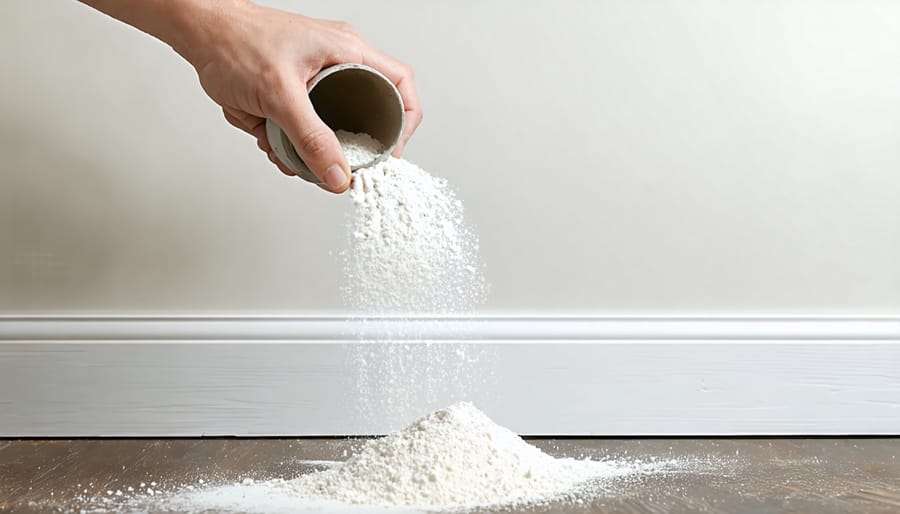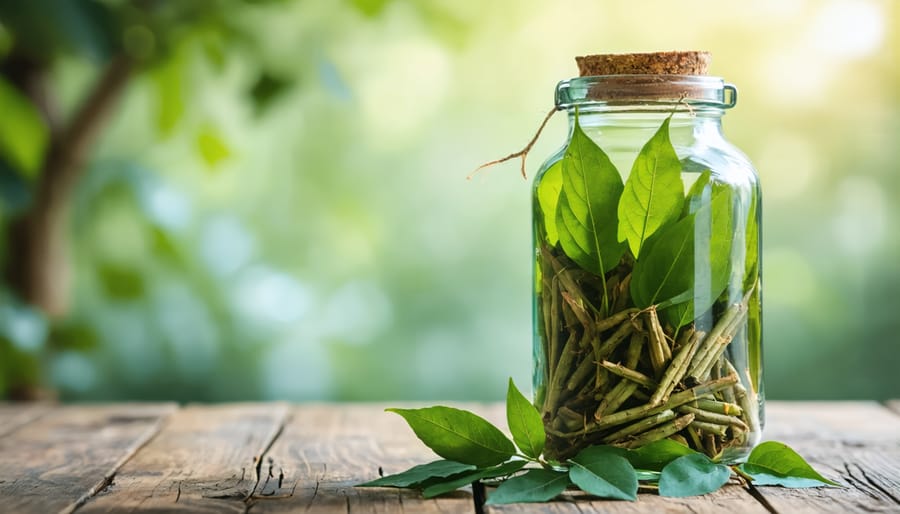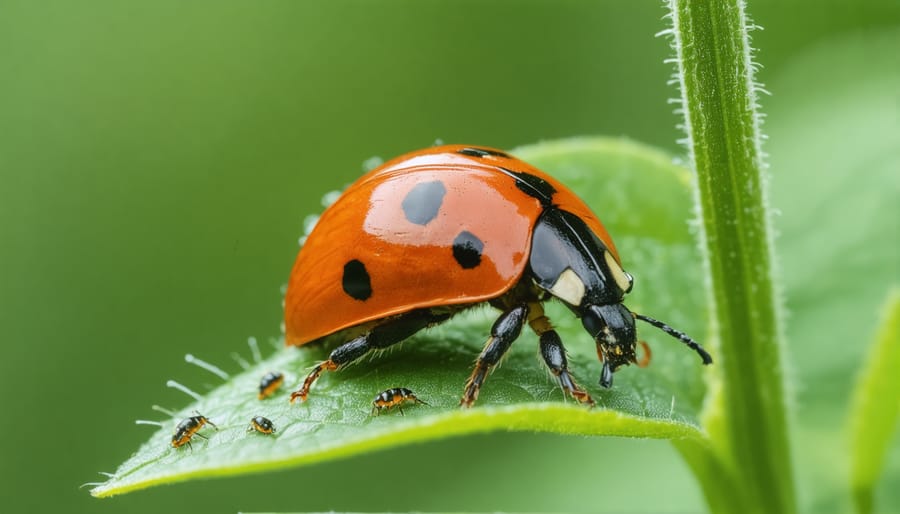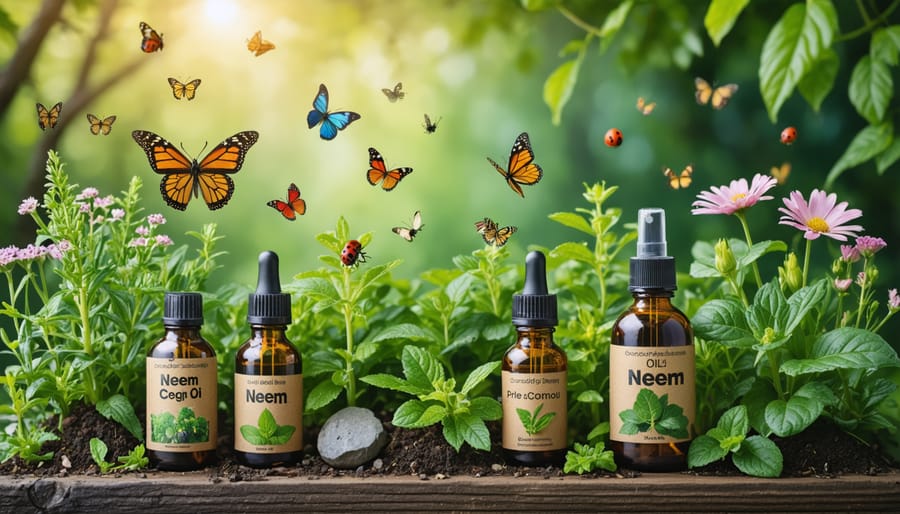Choose natural, plant-based insecticides like neem oil, pyrethrin, or diatomaceous earth to safely control pests without harmful chemicals. Eco-friendly cleaning tips can also help deter pests by eliminating food sources and breeding grounds. Employ physical barriers and traps, such as copper strips, row covers, or sticky traps, to prevent pest access to plants or catch invaders without insecticides. Harness the power of beneficial insects like ladybugs, lacewings, and parasitic wasps, which are natural predators of common garden pests.
Diatomaceous Earth
Diatomaceous earth is a fine, powdery substance made from the fossilized remains of tiny aquatic organisms called diatoms. This natural material is highly absorbent and has microscopic sharp edges that make it effective at controlling various household pests. When insects like ants, cockroaches, fleas, and bedbugs come into contact with diatomaceous earth, the powder sticks to their exoskeletons and causes them to dehydrate and die.
To use diatomaceous earth for pest control, sprinkle a thin layer of the powder in areas where you’ve noticed pest activity, such as along baseboards, in cracks and crevices, and around entry points. Be sure to use food-grade diatomaceous earth, as this type is safe for use around pets and humans. Avoid applying the powder in damp or wet areas, as moisture reduces its effectiveness. Reapply every few days or as needed until the pest problem is resolved.
When applying diatomaceous earth, wear a dust mask to avoid inhaling the fine particles, and keep children and pets away from treated areas until the powder settles. With consistent use, this natural substance can provide a safe and effective way to control household pests without resorting to harsh chemicals.

Boric Acid
Boric acid is a naturally-occurring compound that can be an effective and environmentally friendly pest control solution. This fine white powder works by disrupting the digestive and nervous systems of insects, leading to their dehydration and death. Boric acid is particularly useful against ants, cockroaches, silverfish, and termites.
To use boric acid safely and effectively, start by identifying the areas where pests are active. Sprinkle a thin layer of the powder in these locations, such as along baseboards, in cracks and crevices, and near entry points. Avoid applying boric acid in areas easily accessible to children and pets, as ingestion can be harmful.
Insects will carry the powder back to their nests, inadvertently spreading it to other colony members. For best results, reapply boric acid every few weeks or after cleaning the treated areas. Remember to wear gloves and a dust mask when handling the powder to minimize skin and respiratory irritation.
While boric acid is generally safe when used as directed, it’s essential to keep it away from food surfaces and storage areas. With proper application and precautions, boric acid can be a powerful tool in your environmentally friendly pest management arsenal.
Essential Oils
Peppermint Oil
Peppermint oil is a highly effective natural pest deterrent that works against spiders, ants, and mosquitoes. Simply mix a few drops of peppermint essential oil with water in a spray bottle and apply it around windows, doors, and other entry points. The strong scent of peppermint repels these pests, keeping your home bug-free without harsh chemicals. As a bonus, peppermint leaves a fresh, clean aroma that complements your earth-friendly home decor. Reapply the peppermint spray every few days or after rain for continuous protection. This natural remedy is safe for use around children and pets, making it an ideal choice for eco-conscious households.
Citrus Oils
Citrus oils, such as lemon, orange, and lime, are potent natural pest repellents. The strong scent of these oils can deter a wide range of insects, including ants, mosquitoes, and flies. Simply mix a few drops of the essential oil with water in a spray bottle and apply to affected areas. You can also use citrus peels to keep pests at bay – place them near entry points or in problem areas. The limonene in citrus oils is particularly effective against aphids, mites, and scale insects. However, be cautious when using citrus oils around pets, as they can be toxic if ingested.

Neem Oil
Neem oil, derived from the seeds of the neem tree, is a powerful natural insecticide that can effectively control a wide range of garden pests. This versatile oil works by disrupting the life cycle of insects, preventing them from feeding and reproducing. When applied to plant foliage, neem oil coats the leaves and suffocates small soft-bodied insects like aphids, whiteflies, thrips, and spider mites.
To use neem oil in your garden, mix it with water according to the product instructions and apply it using a spray bottle or garden sprayer. Thoroughly coat the tops and undersides of leaves, as well as stems, to ensure maximum coverage. Reapply the neem oil solution every 7-14 days, or after heavy rain, for continued pest control.
In addition to its insecticidal properties, neem oil can also help prevent fungal diseases like powdery mildew and black spot. As a horticultural oil, it smothers fungal spores and prevents them from germinating on plant surfaces. When using neem oil, always test it on a small area of the plant first to ensure it doesn’t cause any adverse reactions. Apply the oil in the early morning or evening to avoid leaf burn and allow it to dry before beneficial insects become active.
Insecticidal Soaps
Insecticidal soaps are a safe and effective way to control soft-bodied insects like aphids, mealybugs, spider mites, and whiteflies. These soaps are made from potassium fatty acids, which penetrate the insect’s outer coating and cause cell disruption, ultimately leading to dehydration and death. When applied properly, insecticidal soaps have minimal impact on beneficial insects and are gentle on plants. To use, mix the soap with water according to the label instructions and spray directly on the pests, making sure to cover the undersides of leaves where many insects hide. Reapplication may be necessary every 4-7 days until the infestation is under control. It’s best to apply insecticidal soaps in the early morning or late evening to avoid leaf burn and to ensure the solution doesn’t evaporate too quickly. Always test the soap on a small part of the plant first to check for any adverse reactions.
Beneficial Insects
One of the most environmentally friendly ways to control pests in your garden is by harnessing the power of beneficial insects. Ladybugs, for example, are voracious predators that can devour dozens of aphids, mealybugs, and other soft-bodied pests each day. Praying mantises are another effective ally, using their powerful front legs to snatch and eat a wide variety of insects, including caterpillars, flies, and even small crickets.
Lacewings, both in their larvae and adult stages, are also valuable predators that prey on aphids, thrips, and mites. Parasitic wasps lay their eggs inside the bodies of pests like tomato hornworms, effectively killing them as the wasp larvae develop.
To attract these helpful bugs to your garden, plant a diverse array of flowers and herbs that provide nectar and pollen. Dill, fennel, yarrow, and cosmos are particularly attractive to many beneficial insects. You can also purchase live ladybugs, praying mantises, and other predatory insects from garden supply retailers to give your garden’s natural defenses a boost. Creating an inviting habitat for these tiny heroes and letting them work their magic can significantly reduce pest populations without resorting to harsh chemicals. It’s a key component of eco-friendly landscaping that promotes a healthier, more balanced ecosystem in your outdoor spaces.

By choosing environmentally friendly pest control products, you can effectively manage insect issues while minimizing harm to the planet and your family’s health. Natural solutions like diatomaceous earth, neem oil, and essential oils offer a safer alternative to toxic chemical insecticides. These eco-friendly options break down quickly in the environment and pose fewer risks to beneficial insects, wildlife, and humans. Plus, many of these methods are cost-effective and readily available at home improvement stores or online retailers.
Opting for green pest control supports a healthier home environment by reducing exposure to potentially dangerous substances. You can feel good about using products that are gentle on your indoor and outdoor spaces without compromising effectiveness. So next time you face a pest problem, consider reaching for one of these earth-friendly solutions first. With a little patience and persistence, you can achieve a bug-free home the natural way.





